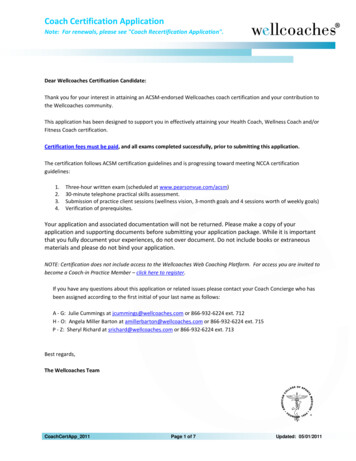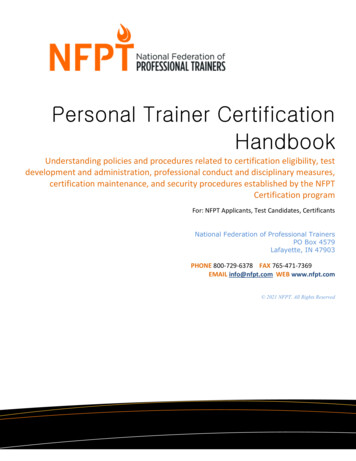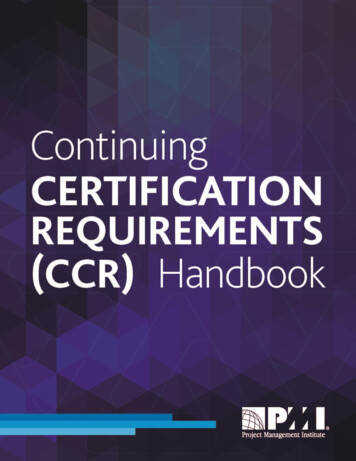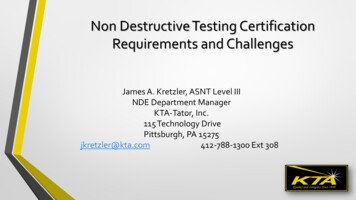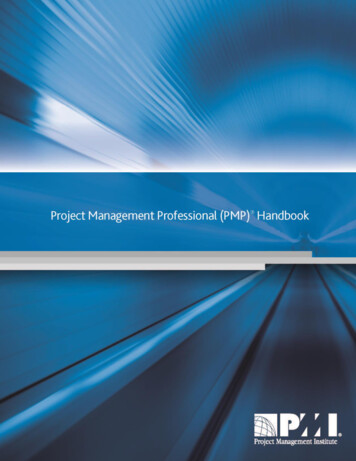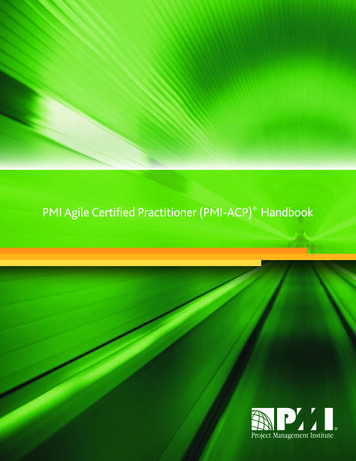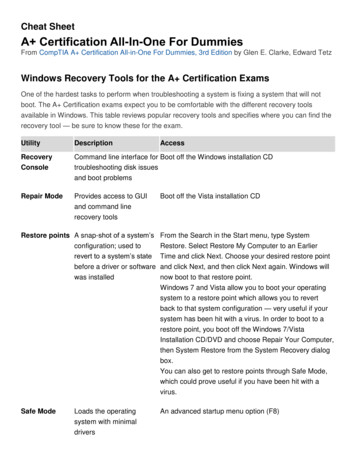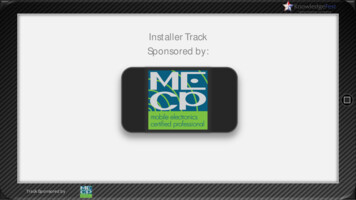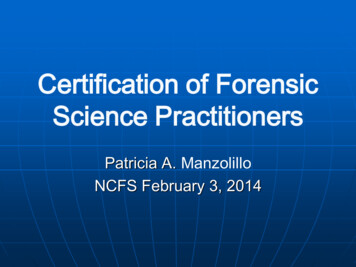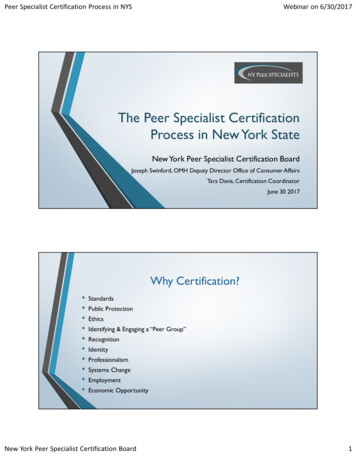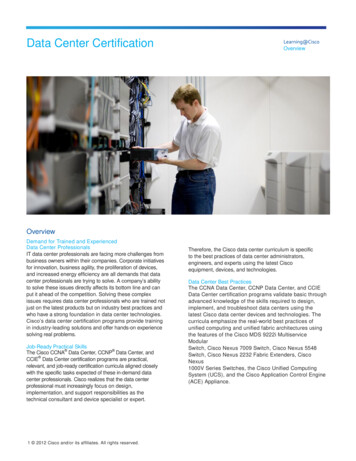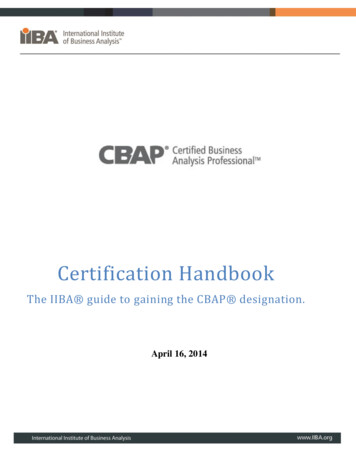
Transcription
Certification HandbookThe IIBA guide to gaining the CBAP designation.April 16, 2014
Table of ContentsTable of Contents . 221.0About this Handbook . 32.0About International Institute of Business Analysis . 32.1IIBA Vision Statement. 42.2IIBA Mission Statement . 42.3Fair & Equitable Policy. 43.0IIBA BABOK Guide Overview . 44.0About the CBAP Certification . 54.1What is Certification?. 54.2Definition of a Business Analysis Practitioner . 5 4.3CBAP Certification Program Overview . 54.4Benefits of CBAP Certification . 65.0CBAP Certification Requirements . 75.1Work Experience Requirement . 75.2Knowledge Area Requirement . 95.3Education Requirement . 105.4Professional Development Requirement . 105.5Reference Requirement. 106.0CBAP Application and Exam Process . 116.1Step 1: Applying for and Paying for CBAP Certification . 126.2Step 2: Paying for the Exam . 136.3Step 3: Registering for the Exam . 156.4Step 4: Preparing for the Exam . 156.5Step 5: Taking the Exam . 167.0Granting CBAP Certification . 188.0Re-writing the CBAP Exam . 199.0Maintaining CBAP Certification and Recertification . 199.1Suspending or Withdrawing CBAP Certification. 20 10.0Audit of Candidate and CBAP Information . 2011.0Resolution of Appeals & Complaints . 20
1.0 About this HandbookThe purpose of this handbook is to provide Certified Business Analysis Professional (CBAP ) applicantsand exam candidates the information needed to understand the International Institute of Business Analysis(IIBA ) organization and the process to become certified.2.0 About International Institute of Business AnalysisIIBA is an independent, non-profit professional association serving the growing field of business analysis.The IIBA mission includes the development and maintenance of standards for the practice of business analysisand for the certification and recognition of its practitioners. IIBA is the first organization to offer the formalcertification for business analysis professionals.To facilitate the public recognition and certification of qualified practitioners, IIBA is responsible for: Creating and developing awareness and recognition of the value and contribution of the businessanalyst. Defining and maintaining the Business Analysis Body of Knowledge (BABOK ) Guide. Identifying the required skills and competencies of a qualified practitioner of business analysis. Defining training and professional development standards. Identifying and endorsing education providers. Publicly recognizing and certifying qualified business analysts.IIBA membership includes many important benefits to help support your development and career growth as abusiness analyst including but not limited to:3 Access to a free copy of the Business Analysis Body of Knowledge (BABOK Guide) v2.0 Free access to the Online Library of more than 300 books Discounted fee for IIBA certification exams Knowledge sharing and networking opportunities through the IIBA Community Network Access to exclusive IIBA monthly publications such as the IIBA Quick Tips for Better BusinessAnalysis e-Bulletin Eligibility to join a local IIBA Chapter Access to a free copy of the Business Analysis Competency Model Access to IIBA Webinars on a range of professional development topics Job search capabilities using the Career Centre
Free access to the Agile Extension to the Business Analysis Body of Knowledge (BABOK ) Guide Access to a free copy of the BABOK Learning GuideThe formation of IIBA started in October of 2003, and was formalized at the organization's first AnnualGeneral Meeting in March 2004. IIBA is headquartered in Toronto, Canada and maintains a website atwww.iiba.org.2.1IIBA Vision StatementTo be the world’s leading association for business analysis professionals.2.2IIBA Mission StatementTo develop and maintain standards for the practice of business analysis and for the certification ofpractitioners.2.3Fair & Equitable PolicyIIBA policies and procedures contribute to the development, oversight, evaluation and maintenance of fair andequitable certification and assessment. IIBA complies with all applicable laws and regulations, including theAmericans with Disabilities Act.3.0 IIBA BABOK Guide OverviewThe Business Analysis Body of Knowledge (BABOK ) Guide is the collection of knowledge within theprofession of business analysis and reflects current generally accepted practices. The BABOK Guide isdefined and enhanced by the business analysis professionals who apply it in their daily lives. The BABOK Guide describes business analysis areas of knowledge, their associated activities and tasks, and the skillsnecessary to be effective in their execution.Since the BABOK Guide is growing and evolving, each release must be considered a move toward thecomplete body of knowledge. Additions will be made periodically based on feedback and changes to generallyaccepted practices. While specific business analysis techniques may be referenced in the BABOK Guide, thecriteria for including information in the guide are that it is proven, generally accepted and widely applied. TheBABOK Guide is a reference for professional knowledge for business analysis and provides the basis for theCBAP certification.The BABOK Guide is composed of six knowledge areas plus underlying competencies. For more informationabout the BABOK Guide, please visit the Business Analysis Body of Knowledge section of the IIBAwebsite.4
4.0 About the CBAP Certification4.1What is Certification?There are many definitions of professional certification, but the general meaning involves the concept of acertifying organization approving the knowledge, experience, skills, and expertise of the certified individual.Certification involves formal recognition of achievement after proving competency through an actualdemonstration of a designated set of skills and/or knowledge.A business analysis professional certification is of growing importance within business and informationtechnology projects as the range and depth of required professional knowledge continues to expand.The CBAP certification process includes demonstrating the required experience, knowledge andcompetencies of a qualified practitioner of business analysis according to requirements designated by IIBA.4.2Definition of a Business Analysis PractitionerThe business analysis practitioner is responsible for identifying the business needs of his or her clients andstakeholders to help determine solutions to business problems.The business analysis practitioner is responsible for requirements development and requirements management.Specifically, the business analysis practitioner elicits, analyzes, validates and documents business,organizational and/or operational requirements. Solutions are not predetermined by the business analysispractitioner, but are driven solely by the requirements of the business. Solutions often include a systemsdevelopment component, but may also consist of process improvement or organizational change.The business analysis practitioner is a key facilitator within an organization, acting as a bridge between theclient, stakeholders and the solution team. Business analysis is distinct from financial analysis, projectmanagement, quality assurance, organizational development, testing, training, and documentationdevelopment. However, depending on the organization, a business analysis practitioner may perform some orall of these related functions.4.3CBAP Certification Program OverviewA CBAP recipient is an elite member of the business analysis community, and a recognized expert inidentifying the business needs of an organization in order to determine business solutions. CBAP recipientsare senior BAs who have the skill and expertise to perform business analysis work on projects of various sizesand complexities. More and more companies are recognizing the CBAP designation and the value andexpertise these professionals bring to their organizations.You will want to consider the many professional benefits of earning the CBAP designation if you have anadvanced level of knowledge and experience, and are working in any of the following roles:5 Business analysis Systems analysis Requirements analysis or management Process management Consulting
This certification program has been carefully designed to be in compliance with the International StandardsOrganization (ISO) 17024 standard for certifying the competence of personnel. The program is also intendedto achieve ISO approval.Certification applicants should be aware that the application process is a screening process for the exam.Therefore, applicants should be very familiar with the requirements for applying, and with the applicationprocess as described further in this handbook.This CBAP certification is targeted to senior business analysts only. IIBA’s Certification of Competency inBusiness Analysis (CCBA ) certification is for experienced business analysts who have acquired core BAskills. The certification examination is offered in the English, German and Japanese language; other languagesmay be included in the future.A certification applicant is not required to be an IIBA member in order to take the certification examination,but IBA members receive discounts on certification exam fees.4.4Benefits of CBAP CertificationBenefits to the individual may include: Competence in the principles and practices of business analysis.Participation in a recognized professional group.Recognition of professional competence by professional peers and management.Advanced career potential due to recognition as a professional Business Analysis practitioner.Provides individuals with personal satisfaction of accomplishing a milestone in their BA careers.Certification can improve overall performance, remove uncertainty and widen market opportunities.The process of achieving and maintaining certification helps ensure you are continually improving andrefining your activities.Potentially higher income for being formally recognized as an experienced BA professional. For moredetails, view this recent salary survey.Demonstrates knowledge of the skills necessary to be an effective senior member of the businessanalysis community.Benefits to the organization may include: 6Provides advancement and recognition opportunities for staff.Demonstrates to customers, competitors, suppliers, staff and investors that you use industry-standardbusiness analysis practices.Demonstrates to your stakeholders that your business is run effectively.The regular assessment process will improve staff responsibility, commitment and motivation.Establishment and implementation of business analysis practices as outlined in the Business Analysis Bodyof Knowledge (BABOK ) Guide by individuals recognized as being knowledgeable and skilled.More reliable, higher quality results produced with increased efficiency and consistency by BAprofessionals who use industry standard BA techniques.Identifies professional business analysts to clients and business partners.Offers professional development and recognition for business analysts.
Demonstrates commitment to the field of business analysis, increasingly recognized as a vital componentof any successful project.5.0 CBAP Certification RequirementsEach CBAP applicant must meet the requirements specified in this section to be eligible to write the exam.To earn the CBAP designation, applicants must meet the following criteria: Minimum 7500 hours of BA work experience aligned with the BABOK Guide in the last 10 yearsMinimum 900 hours in each of four of the six knowledge areasMinimum 21 hours of Professional Development in the past four yearsTwo references from a career manager, client or CBAP recipientSigned Code of ConductIf you don’t meet the requirements for the CBAP certification, you may want to consider applying for theCCBA Designation5.1Work Experience Requirement7,500 hours (approximately five years) of business analysis work experience in the last ten years engaged intasks specifically aligned with the knowledge areas and underlying competencies defined within the BABOK Guide. The ten year time frame is based on the application submitted date.The business analysis work experience can either be activities the applicant has applied directly OR activitiesthe applicant has assisted others in applying—all activities must be aligned with the BABOK Guideknowledge areas and underlying competencies.Acceptable activities include: Hands-on business analysis activities (e.g., requirements gathering, writing requirementsdocumentation, etc.). Coaching or mentoring business analysts with respect to business analysis activities (e.g., planningthe requirements gathering process with the BA, reviewing requirements documents, etc.).Activities that are not acceptable include: Non-supervisory management of business analysis activities (e.g., resource management, statusreporting, performance management, etc.). Teaching of business analysis training courses. Selling requirements tools/software. Project management. Testing (e.g., creating and executing test scripts, reporting on testing status, creating testplans/strategies, etc.). Programming.7
Neither the acceptable and unacceptable activities listed above are comprehensive. These are provided only asa guideline. Each applicant’s work experience will be assessed on a case-by-case basis.The following table lists examples of work experience that will qualify and that will not qualify during theapplication assessment process. This is not a complete list. See below for instructions on how to document thework experience section of the application form.BABOK GuideKnowledge AreaWork Experiencethat QualifiesWork Experiencethat does NOT QualifyBusiness AnalysisPlanning andMonitoringoCreating requirements plan to feed into project planoCreating project planoIdentifying and documenting requirements risksoIdentifying project risksoReporting on requirements progress as input toproject status reportElicitationoFacilitating requirements gathering workshopRequirementsManagement andCommunicationoWalkthroughs and sign-offs of requirementspackageoProviding weekly project statusreportsoPreparing and conducting requirements presentationfor senior executivesoConducting designwalkthroughsEnterprise AnalysisoDetermining business objectivesoCreating Project CharteroCreating business architectureoCreating system or applicationarchitectureoFunctional requirementsooNon-functional requirementsCreating service levelagreementsoUser requirementsoCreating and documentingdesign solutionoReviewing design document and ensuringrequirements are metoCreating design documentooReviewing test strategy, test plans and test cases toensure requirements are metCreating test strategy, test plan ortest casesoExecuting testingoSupporting QA and testing teamoTracking and managing defectsoReviewing defects and working with client todetermine:RequirementsAnalysisSolution Assessmentand Validation Priority of fix Manual work aroundInstructions for Documenting Work Experience:1. The Work Experience section of the application form must be filled out by project as follows: For several small projects within the same year, those projects should be combined into one project.Indicate this on the application under Description.8
List projects in date order with the most recent project experience first. It is mandatory that at least 7500 hours of BA related work in the last ten years has been documentedin order to meet the application requirement. Resumes will not be accepted to complete this requirement. For each project, enter your Total BA Hours. These hours will count towards the minimum 7500hours of business analysis work experience requirement and the minimum 900 hours in four of thesix Knowledge Areas requirement. The Total BA Hours and the tasks you select must be alignedwith the BABOK Guide v2.0. For each project, from the list of tasks in the table, check off the tasks you have completed that arealigned with the BABOK Guide v2.0. Do this for each of the six Knowledge Areas. You can selecta task when you have either performed the task yourself or coached/mentored another businessanalyst in performing the task. For each Knowledge Area, indicate the percentage of the Total BAHours you spent on the tasks you selected. The percentages across all of the Knowledge Areas musttotal 100 within a project. Note: Any tasks you select that are not aligned with the BABOK Guide v2.0 will be removed andthe corresponding hours will be deducted from your Total BA Hours. This could result in your TotalBA Hours falling below the minimum 7500 hours required and/or the minimum 900 hours requiredin four out of the six Knowledge Areas. If either occurs, your application will be declined.2. During the assessment process, the hours deducted for work experience the applicant selects that is notaligned with the BABOK Guide are calculated as follows:a) We take the percentage entered for a Knowledge Area (KA) and multiply it by the number ofTotal BA Hours entered for the project to determine the number of BA Hours for that KA.b) We then subtract the percentage of invalid experience that is selected (i.e., experience notaligned with the BABOK Guide) to total experience selected for that KA to come up with thevalid BA Hours for that KA.c) We do the same for all KAs.d) Then we add up the valid Total BA Hours for KAs across all projects to ensure the applicantmeets the 900 minimum hours requirement in four of the six KAs (see below for thisrequirement).e) Finally, we add up the valid Total BA Hours across all projects to ensure the applicant meetsthe 7500 minimum hours requirement.5.2Knowledge Area RequirementDemonstrated experience and expertise (i.e., a minimum of 900 hours) of business analysis work experienceengaged in tasks specifically aligned with the BABOK Guide in at least four of the six knowledge areas.Note: This minimum of 900 hours in each of four out of the six Knowledge Areas are included in theminimum 7500 hours required for the Work Experience requirement above. This requirement ensures there isa breadth of work experience across the Knowledge Areas.9
5.3Education RequirementHigh school or equivalent education. This is the minimum educational requirement.Note: There will be no reduction in work experience for post secondary education5.4Professional Development RequirementA minimum of 21 hours of professional development in the last four years. The professional developmentmust be completed by the application submitted date and it must meet the following criteria to qualify:1. It must be moderated/facilitated similar to a formal course (i.e., there must be a moderator for thesession, or a facilitator/instructor who leads the group/individual through the material).2. There must be a measurable learning objective (or set of objectives), and those must be directlyapplicable to the role of the business analyst (i.e., in terms of either changing behaviour or improvingskills).3. It cannot simply be a presentation on a specific topic:a. There must be the opportunity for students to interact with the material (e.g., be able to askquestions, make the learning meaningful) ANDb. An opportunity to practice the task or objective being presented and, be assessed by thefacilitator/moderator.4.The subject matter must be directly related to business analysis or its underlying competencies as perthe BABOK Guide.Note: IIBA endorsed courses as per the Endorsed Education Provider (EEP ) program automatically qualifytowards the 21 hours of Professional Development for initial certification because they have already beenassessed to ensure they meet the above criteria.One hour of classroom/contact time is equal to one hour of Professional Development. Fractions ofProfessional Development hours may be reported in quarter (¼) hour increments after one full hour. If theProfessional Development is less than one hour, it does not qualify for any credit.5.5Reference RequirementTwo references from a career manager, client (internal or external) or CBAP recipient are required.In addition: Include one current contact. All references must have known the applicant for at least six months. A career manager is defined by IIBA as the person who is responsible for providing and preparingthe applicant’s annual performance review. Project managers cannot be references unless they are also the applicant’s career manager. Thereference form must clearly indicate they fill both roles or the reference will not qualify. Only two references will be assessed during the application assessment process. It is the applicant’s responsibility to ensure the reference submits their form in time to be consideredfor the exam date of interest and to do any necessary follow-up with their references.10
6.0 CBAP Application and Exam ProcessStep 1: Applying for and Paying for CBAP CertificationStep 2: Paying for the ExamStep 3: Registering for the ExamStep 4: Preparing for the ExamStep 5: Taking the ExamSummary of FeesApplication and ExamFeeApplication Fee (non-refundable)Exam Fee – English and JapaneseExam Fee – GermanMember 125 325* 770Non-member 125 450 880Member 50 250Non-member 50 375* 430 540Other feesFeeExam Cancellation Fee (CBT)Exam Re-write Fee – English andJapaneseExam Re-write Fee – German*IIBA is partnering with The European Association of Business Analysis (EABA) and in a joint effort, is nowoffering business analysis certification exams in German-speaking Europe and at all test center locationswhere IIBA exams are offered.The German Exam and Exam Re-write member fees of 770 and 430 respectively apply for IIBA membersas well as for SGO, GFO, ÖVO members.If you are not an IIBA member but you are a member of SGO, GFO or ÖVO, you must emailzertifizierung@the-eaba.org to validate your membership in order to benefit from the member fee andto make payment.Note:1. All fees are payable in U.S. dollars (USD) plus GST/HST if you are a Canadian resident or aGST/HST registrant.2. The application fee is not refundable regardless of whether an application is approved or declined.3. Additional transaction fees may apply (see details in the sections below).4. Application fee payments can be made by VISA, MasterCard, AMEX in the online application, orby cheque or money order and mailed in.5. Exam fee payments can be made by PayPal, cheque or money order.11
6. For payments made by cheque or money order please mail to:Certification701 Rossland Road East, Suite 356Whitby, ONCanadaL1N 9K37. The Exam Cancellation Fee is payable to the test administrator as per the instructions on the website at CBTLocations.Confidentiality of InformationThe CBAP Application Form, exam results and all other CBAP certification program-related materials arekept private and confidential. This information will not be disclosed to anyone other than the applicant withoutthe applicant’s consent.To request the release of an exam result to a third party, IIBA must be provided with a written requestidentifying which exam result may be disclosed and the person or organization to which the result should bedisclosed. Any violation of the IIBA Confidentiality Policy will be subject to disciplinary action(s) asdescribed in the IIBA Constitution.Requests should be submitted to the address listed on our website at www.iiba.org.Notwithstanding any other confidentiality obligation owed by the IIBA to the applicant, in the eventthat the applicant’s application fee and/or examination fee has been paid by a third party (“Sponsor”),the applicant hereby irrevocably authorizes and directs the IIBA to release Confidential ResultsInformation to that Sponsor.6.1Step 1: Applying for and Paying for CBAP CertificationTo be eligible for the CBAP designation, the applicant must:1. Meet the above applicant requirements (see Section 5.0).2. Complete the CBAP Application Form online.3. Determine two professional references that indicate suitability as an applicant for the CBAP designation. The online application system will automatically send an email to the referencesrequesting them to log in to the system to complete the reference process.4. Agree to adhere to the CBAP Code of Ethical Conduct & Professional Standards included in theonline application.5. Print a copy of the online application for recording purposes.6. Submit the following:a. The completed online application.12
b. The application fee of 125 USD (plus GST/HST for Canadian residents) for allapplicants (IIBA member and non-member) payable online by credit card with the onlineapplication, or by cheque or international money order to “International Institute ofBusiness Analysis”. This fee is not refundable regardless of whether an application isapproved or declined.7. The system will display a message indicating that the application has been submitted to IIBA.8. IIBA will assess the application for completeness and fulfillment of the CBAP certificationrequirements and will notify the applicant, via email, of the results of this assessment within two(2) weeks of receiving the application and application fee.9. If the application is approved, the applicant is eligible to write the CBAP Exam at this time.NOTE – The applicant has a maximum of one (1) year from the date of their application approvaland exam eligibility email to successfully pass the exam. It is the applicant’s responsibility toensure the application does not lapse.10. If an application is declined, the applicant is not eligible to write the CBAP exam at this time.The application assessment results email will include the reason the application was not approved.The exam fee, if submitted with the application package, will be refunded upon request or can beput towards the exam if the applicant intends on reapplying. The applicant may reapply forCBAP certification after three (3) months of receiving their application assessment results emailand after the applicant has remedied the reasons for the application being declined. The applicantmay also appeal the Certification Body’s decision to decline the application; the ApplicationAppeal process can be obtained by emailing certification@iiba.org.6.2Step 2: Paying for the ExamThe exam fee for English and Japanese exams is 325.00 USD (for IIBA members) or 450 USD (for nonmembers) (plus GST/HST for Canadian residents).The exam fee and exam rewrite fee for the German exam are (plus GST/HST for Canadian residents):German CBAP Exam fee (non-IIBA members) 880German CBAP Exam fee (IIBA members) 770*German CBAP Exam Fee (for SGO, GFO, ÖVO members ) 770*If you are not an IIBA member but you are a member of SGO, GFO or ÖVO, you must emailzertifizierung@the-eaba.org to validate your membership in order to benefit from the member fee andto make payment.If paying a member fee, the applicant must be a member at the time of submitting their exam fee; otherwise,they must pay the non-member fee.The exam fees pay for the exam sitting. If the app
skills. The certification examination is offered in the English, German and Japanese language; other languages may be included in the future. A certification applicant is not required to be an IIBA member in order to take the certification examination, but IBA members receive discounts on certification
